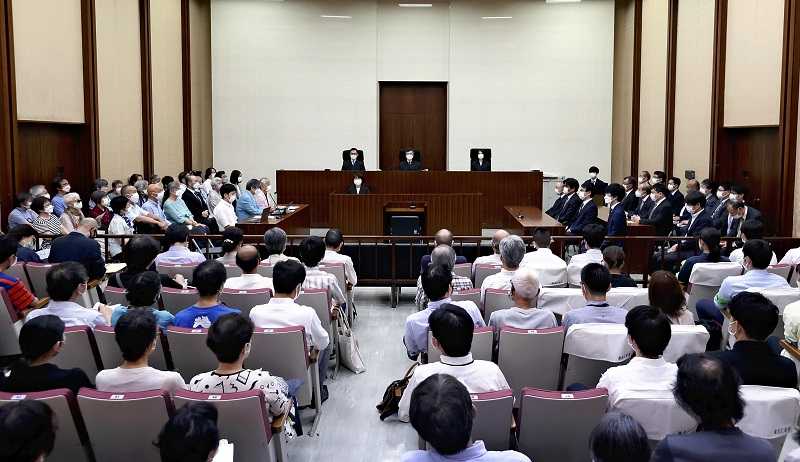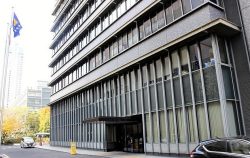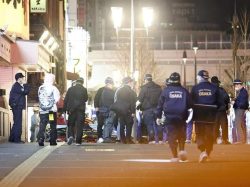District court, Supreme Court in conflict on whether Fukushima N-accident was avoidable

The courtroom at Tokyo District Court, where a ruling on the responsibility of former executives of Tokyo Electric Power Company Holdings, Inc. for the Fukushima nuclear plant accident was handed down Wednesday
17:49 JST, July 14, 2022
A ruling this week by the Tokyo District Court is in direct conflict with a ruling last month by Japan’s Supreme Court.
The district court found for the first time that former executives of Tokyo Electric Power Company Holdings, Inc. were legally responsible for the 2011 accident at the Fukushima No. 1 nuclear power plant. But the Supreme Court had already ruled, in a different case, that the accident was most likely unavoidable.
It remains unclear whether the district court’s ruling will be upheld by a higher court or serve as a precedent in other class action lawsuits.
A key question in both cases was whether it was possible to avoid the seawater inundation of parts of the plant caused by tsunami following the Great East Japan Earthquake in 2011. The inundation ultimately caused meltdowns in three of the plant’s nuclear reactors.
The district court ruling issued Wednesday, running more than 600 pages, said the company operating the nuclear plant “had an obligation to prevent a major accident.” The court said this responsibility included even highly unlikely accidents.
The ruling mentioned the damage caused when the accident dispersed radioactive materials over a wide area, and indicated this event “could have led” to the collapse of the nation. Given that TEPCO’s own survival was plunged into jeopardy, the court ruled that the executives had a duty to order the implementation of measures that would prevent such a serious situation from eventuating.
The court was scathing toward the former executives, including former Chairman Tsunehisa Katsumata, for not taking the minimum anti-tsunami measures required. The ruling said they “fundamentally lacked safety awareness and a sense of responsibility.”
Previous lawsuits filed by shareholders that resulted in courts ordering the payment of compensation generally involved cases of cover-ups or involvement in wrongdoing by former management officials.
Chuo University Prof. Shuya Nomura, an expert on corporate law, said: “Given that nuclear power operations are a special kind of industry, executives are required to perform their job with a high responsibility of care. If the operators of other nuclear plants do not quickly implement appropriate measures, they must seriously consider that they could be held accountable.”
Diametrically opposed rulings
The district court ruling stated that a long-term earthquake assessment by the government was “reliable.” Consequently, the court strictly pointed to the responsibility of the former executives because if they had taken further steps to prevent seawater from entering the nuclear power facility, in consideration of the long-term assessment, the accident could have been prevented.
However, the Supreme Court had reached a completely different conclusion not long before in a class action lawsuit in which people who were forced to evacuate their homes due to the nuclear accident demanded compensation from the government. In its ruling handed down on June 17, the court did not touch on the reliability of the government’s long-term assessment, but decided that the tsunami generated by the earthquake were larger than expected and that the accident “could not have been prevented, even if the government had ordered TEPCO to implement countermeasures.”
The fact that the government and TEPCO had different information about possible earthquake and tsunami risk and therefore had considered different countermeasures was one factor behind the opposing conclusions reached by the courts. For instance, TEPCO calculations as of March 2008 estimated that tsunami up to 15.7 meters high could strike the plant, but a report containing these results did not reach the government until March 7, 2011 — four days before the Great East Japan Earthquake.
The ‘zero risk’ element
One experienced judge said the opposing rulings issued by the district and top courts indicated that their views of the background circumstances and their views of the responsibilities of the government and TEPCO were different.
However, lawyer Jun Masuda, a former Tokyo High Court judge with expertise in lawsuits against nuclear power plants, was critical of the district court’s ruling. “In a situation in which the arrival of a massive tsunami cannot be said to be imminent, management are being forced to shoulder the excessive obligation of meeting demands that there is absolutely zero risk of an accident,” Masuda said. “This also raises concerns that operators in the energy and transportation sectors, which are at risk of being affected by disasters, might shrink from making important business decisions.”
The district court ruling stated that if Katsumata, 82, and the other executives had instructed that additional safety measures be adopted, TEPCO officials could have considered steps to prevent seawater from entering the nuclear reactor facilities as options that could be quickly implemented, and “the possibility that such steps would be taken is high.”
The Supreme Court also touched on this point, saying the tsunami countermeasures “at the time” fundamentally centered on building seawalls, rather than preventing seawater from entering the nuclear plant.
“There is still room for debate over to what degree making the plant ‘watertight’ was possible at that time,” the experienced judge said. “I think this will probably be a point of contention in the appeal trial.”
Top Articles in Society
-

Man Infected with Measles Reportedly Dined at Restaurant in Tokyo Station
-

Man Infected with Measles May Have Come in Contact with Many People in Tokyo, Went to Store, Restaurant Around When Symptoms Emerged
-

Woman with Measles Visited Hospital in Tokyo Multiple Times Before Being Diagnosed with Disease
-

Australian Woman Dies After Mishap on Ski Lift in Nagano Prefecture
-

Foreign Snowboarder in Serious Condition After Hanging in Midair from Chairlift in Nagano Prefecture
JN ACCESS RANKING
-

Japan PM Takaichi’s Cabinet Resigns en Masse
-

Japan Institute to Use Domestic Commercial Optical Lattice Clock to Set Japan Standard Time
-

Israeli Ambassador to Japan Speaks about Japan’s Role in the Reconstruction of Gaza
-

Man Infected with Measles Reportedly Dined at Restaurant in Tokyo Station
-

Man Infected with Measles May Have Come in Contact with Many People in Tokyo, Went to Store, Restaurant Around When Symptoms Emerged























